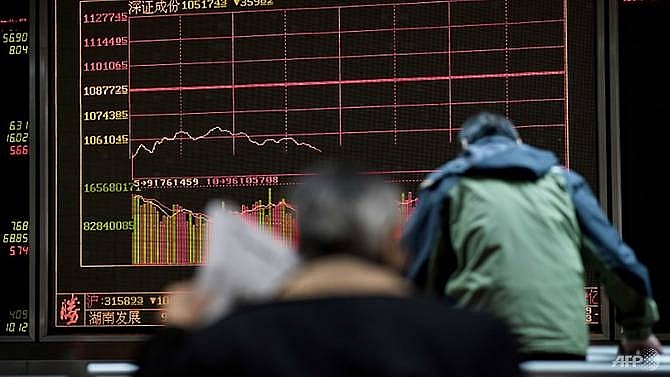Chinese stocks sink to lowest levels since 2014
 |
| A man reads a newspaper while keeping an eye on stock price movements at a securities company in Beijing. (Photo: AFP/NICOLAS ASFOURI) |
The benchmark Shanghai Composite Index dropped 5.22 per cent, or 142.38 points, to 2,583.46, marking the lowest level since November 2014.
The Shenzhen Composite Index, which tracks stocks on China's second exchange, plummeted 6.45 per cent, or 89.15 points, to 1,293.90, the lowest point since September 2014.
READ: Asia shares shattered in early trade by Wall Street rout, China's yuan under fire It is the second dive in Chinese bourses this week after both Shanghai and Shenzhen fell nearly four per cent on Monday.
"(The) Chinese market already suffered a blow in confidence after Monday and investors were in a very sensitive state of mind," said Zhang Yanbing, analyst with Zheshang Securities.
"So they panicked and overacted today."
Other Asian markets also tumbled Thursday following the worst session on Wall Street for months, as US President Donald Trump said the Federal Reserve had "gone crazy" with plans for higher interest rates.
"With the global markets rout, mainland shares cannot stay safe," Guangzhou Wanlong Securities said in a research note.
"Interest rate put aside, the Sino-US trade spat is to blame for the October market rout because people are worried the friction would evolve into a political confrontation."
Tokyo and Hong Kong both shed around four per cent, while Taipei was down around six per cent. Seoul fell more than four per cent and Sydney and Singapore both dropped more than 2.5 per cent.
READ: IMF chief defends rate hikes after Trump slams 'crazy' Fed Trump told reporters that he thought that "the Fed is making a mistake" as he arrived for a campaign rally ahead of the US mid-term elections.
Trump has repeatedly touted Wall Street records as proof of the success of his economic programme. But he downplayed the first major drop in months, saying it was a "correction that we've been waiting for".
But International Monetary Fund chief Christine Lagarde hit back on Thursday, defending rate hikes that she said were justified by fundamentals.
"It is clearly a necessary development for those economies that are showing much improved growth, inflation that is picking up... unemployment that is extremely low," she told reporters in Bali where the Fund is meeting.
'JUST BEGINNING'
The rout in US shares followed substantial losses on European bourses, due in part to tensions between Brussels and Rome over Italian budget plans that have revived fears about the eurozone.
Bourses in Paris and Frankfurt both lost more than two per cent, while London fell 1.3 per cent.
"It's just a beginning," CEB International research head Banny Lam told Bloomberg.
"The US tech bubble may take a while to burst and we are facing many external uncertainties - trade wars, risks in emerging markets currencies and oil price."
Many of the biggest US names fell hard in Wednesday's session, with Apple, Boeing and Facebook all slumping more than four per cent and Amazon, Nike and Microsoft shedding more than five per cent.
Stocks have been under pressure since the yield on 10-year US Treasury bonds jumped above three per cent last week, a sudden move that raised fears of an overheating economy, speeding inflation and more aggressive Federal Reserve rate hikes.
In Hong Kong - where the benchmark Hang Seng index is already down 15 per cent this year - some of the biggest listed companies were also under pressure.
Chinese internet group Tencent fell for the tenth consecutive day, dropping more than seven per cent through morning trade.
China Mobile shares fell 3.7 per cent, insurance group Ping An dropped 4.1 per cent and China Construction Bank lodged a slide of 3.2 per cent.
The turmoil on stock markets came after the International Monetary Fund slashed its global growth forecast Monday on worries over the US-China trade war and weakness in emerging markets.
In other markets, oil extended declines in Asian trade Thursday following a sharp build in US crude inventories and fears Hurricane Michael would hurt demand.
What the stars mean:
★ Poor ★ ★ Promising ★★★ Good ★★★★ Very good ★★★★★ Exceptional
Related Contents
Latest News
More News
- Cashless payments hit 28 times GDP in 2025 (February 04, 2026 | 18:09)
- SSIAM and DBJ launch Japan Vietnam Capital Fund (February 04, 2026 | 15:57)
- Banks target stronger profits, credit growth in 2026 (February 04, 2026 | 15:43)
- Vietnam on path to investment-grade rating (February 03, 2026 | 13:07)
- Consumer finance sector posts sharp profit growth (February 03, 2026 | 13:05)
- Insurance market building the next chapter of protection (February 02, 2026 | 11:16)
- NAB Innovation Centre underscores Vietnam’s appeal for tech investment (January 30, 2026 | 11:16)
- Vietnam strengthens public debt management with World Bank and IMF (January 30, 2026 | 11:00)
- Corporate bond market poised for stronger growth cycle (January 28, 2026 | 17:13)
- Vietnam's IPO market on recovery trajectory (January 28, 2026 | 17:04)

 Tag:
Tag:




















 Mobile Version
Mobile Version